Discover the Best Board Games for Every Player
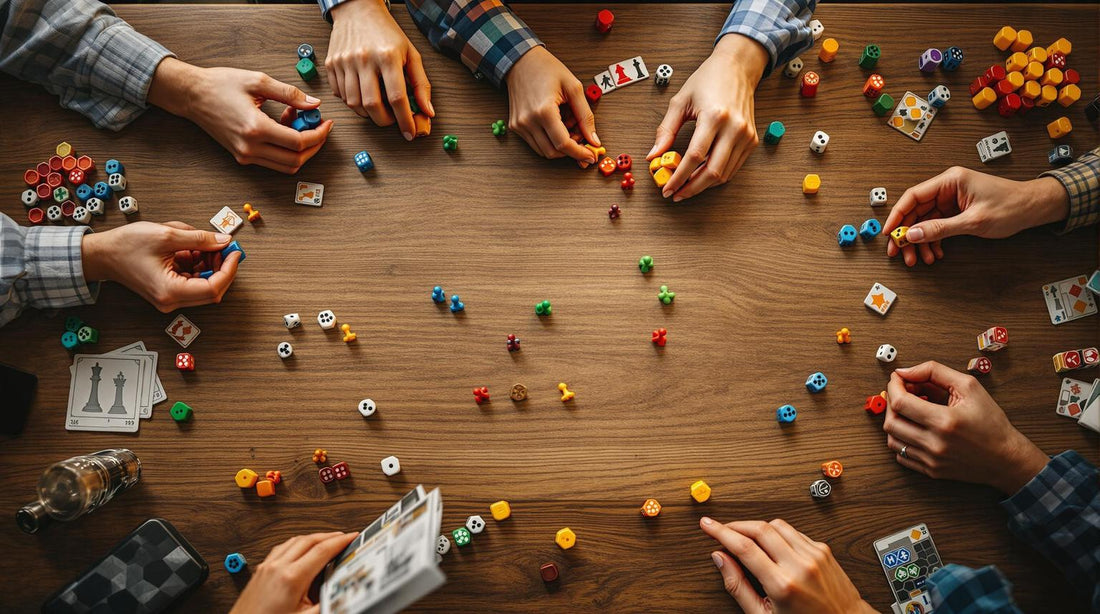
5 Classic Board Games That Boost Problem-Solving Skills
Classic board games like Chess, Catan, Pandemic, Ticket to Ride, and Risk are more than just fun - they're great for building problem-solving skills. These games challenge you to think critically, plan ahead, and adapt strategies. Here's how each game helps:
- Chess: Builds memory, decision-making, and strategic planning through complex moves.
- Catan: Teaches resource management, negotiation, and risk evaluation in a dynamic setup.
- Pandemic: Enhances teamwork, crisis management, and system-level thinking with cooperative gameplay.
- Ticket to Ride: Strengthens spatial reasoning and logistical planning by connecting routes.
- Risk: Combines global strategy, probability analysis, and diplomacy for long-term planning.
Each game focuses on different cognitive skills, making them suitable for all ages and learning environments. Whether you're strategizing in Chess or collaborating in Pandemic, these games turn learning into an engaging experience.
Does Chess Help With Problem Solving?
1. Chess
Chess, one of the oldest and most studied strategy games, has been sharpening minds for over 1,500 years. Played on a 64-square board, this two-player game is a true test of critical thinking and problem-solving skills.
Research from Trier University shows that chess experts have heightened activity in the brain's frontal and parietal cortices, areas crucial for strategic thinking. These changes in the brain lead to real-world benefits that extend far beyond the chessboard.
Why is chess such a powerful tool for building problem-solving skills? It pushes players to:
- Analyze Complex Positions: Every move comes with numerous possibilities that require careful thought.
- Plan Ahead: Players need to think several moves into the future to anticipate outcomes.
- Adjust Strategies: As the game progresses, strategies must evolve to meet new challenges.
Studies back this up, including one involving 4,000 students, which found notable IQ improvements after just four months of playing chess.
| Cognitive Skill | How Chess Builds It |
|---|---|
| Memory | Recognizing and recalling patterns and positions |
| Decision-making | Evaluating options under constraints |
| Strategic planning | Balancing long-term goals with immediate threats |
| Pattern recognition | Spotting tactical opportunities and combinations |
Modern tools like online platforms and apps make learning chess easier than ever, offering interactive lessons and puzzles to build tactical skills.
With its endless complexity - there are more possible game variations than atoms in the observable universe - chess provides a lifetime of challenges. This makes it an unmatched tool for honing analytical and adaptive thinking.
2. Catan
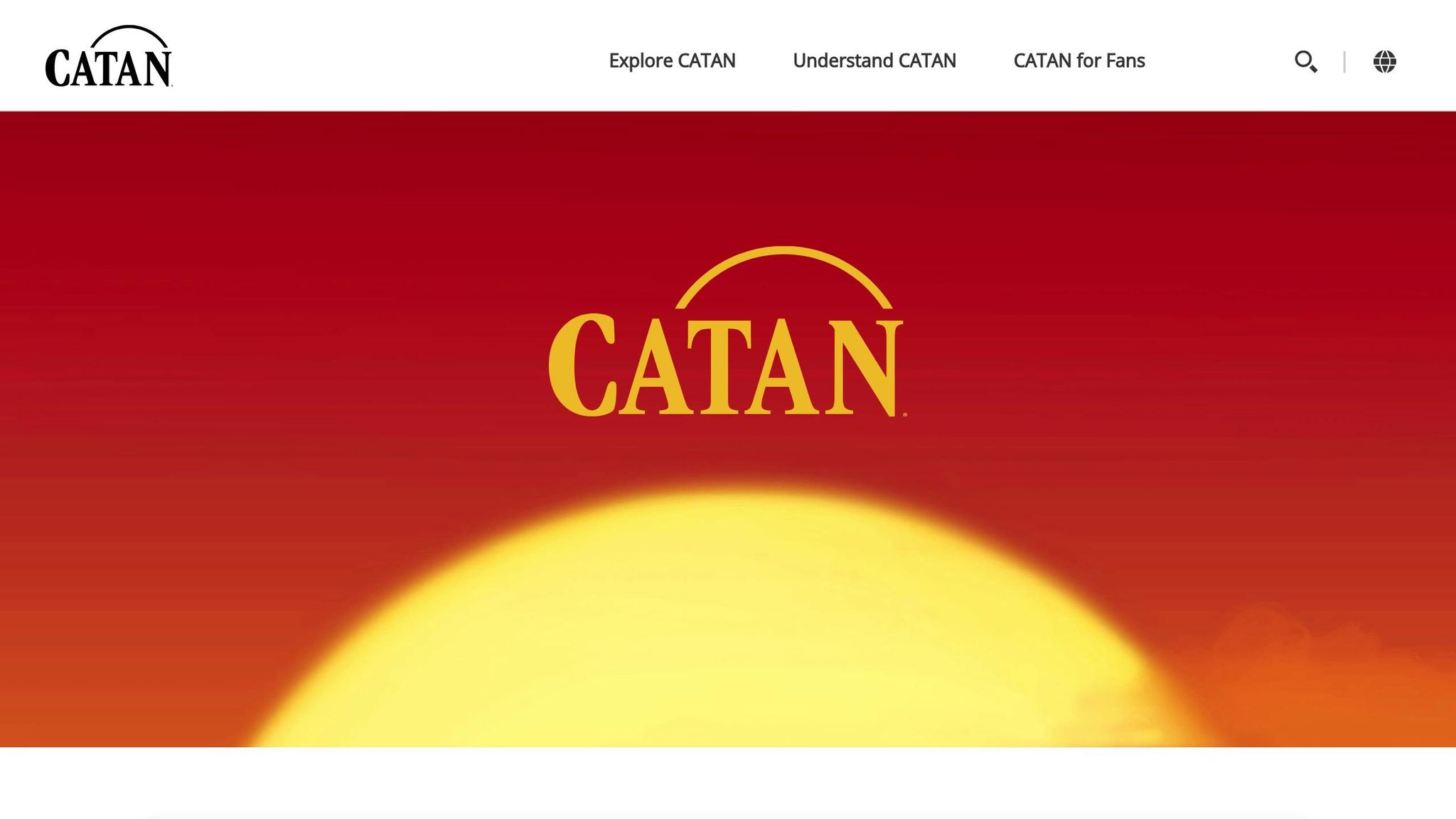
Catan takes the strategic depth of chess and adds a layer of economic decision-making, making it a standout in modern board games. With over 32 million copies sold globally, it's clear this game has made its mark.
Unlike chess, which uses a fixed board, Catan features a modular hexagonal board that changes with every game. This ever-changing setup means players face a new strategic challenge each time, as resource distributions and ideal building spots shift constantly.
Here are three key mechanics that make Catan a great tool for sharpening problem-solving skills:
Resource Management
Players juggle five resources - wood, brick, ore, grain, and wool - while evaluating probabilities and risks. The dice-rolling mechanic introduces unpredictability, encouraging players to adjust their strategies based on likely outcomes.
Strategic Trading
Catan's trading system is all about negotiation and diplomacy. To succeed, players need to balance competition with cooperation, often striking deals with others to secure the resources they need. This mirrors real-life problem-solving, where collaboration is crucial despite limited resources.
Risk and Reward Decisions
Development cards challenge players to weigh short-term needs against long-term goals. The robber mechanic adds another layer of complexity, pushing players to manage resources carefully while staying prepared for unexpected setbacks.
Klaus Teuber's design ensures every decision feels impactful, with no clear-cut answers. It's no surprise that Catan is now being used in educational settings to teach strategic thinking and resource management skills.
3. Pandemic
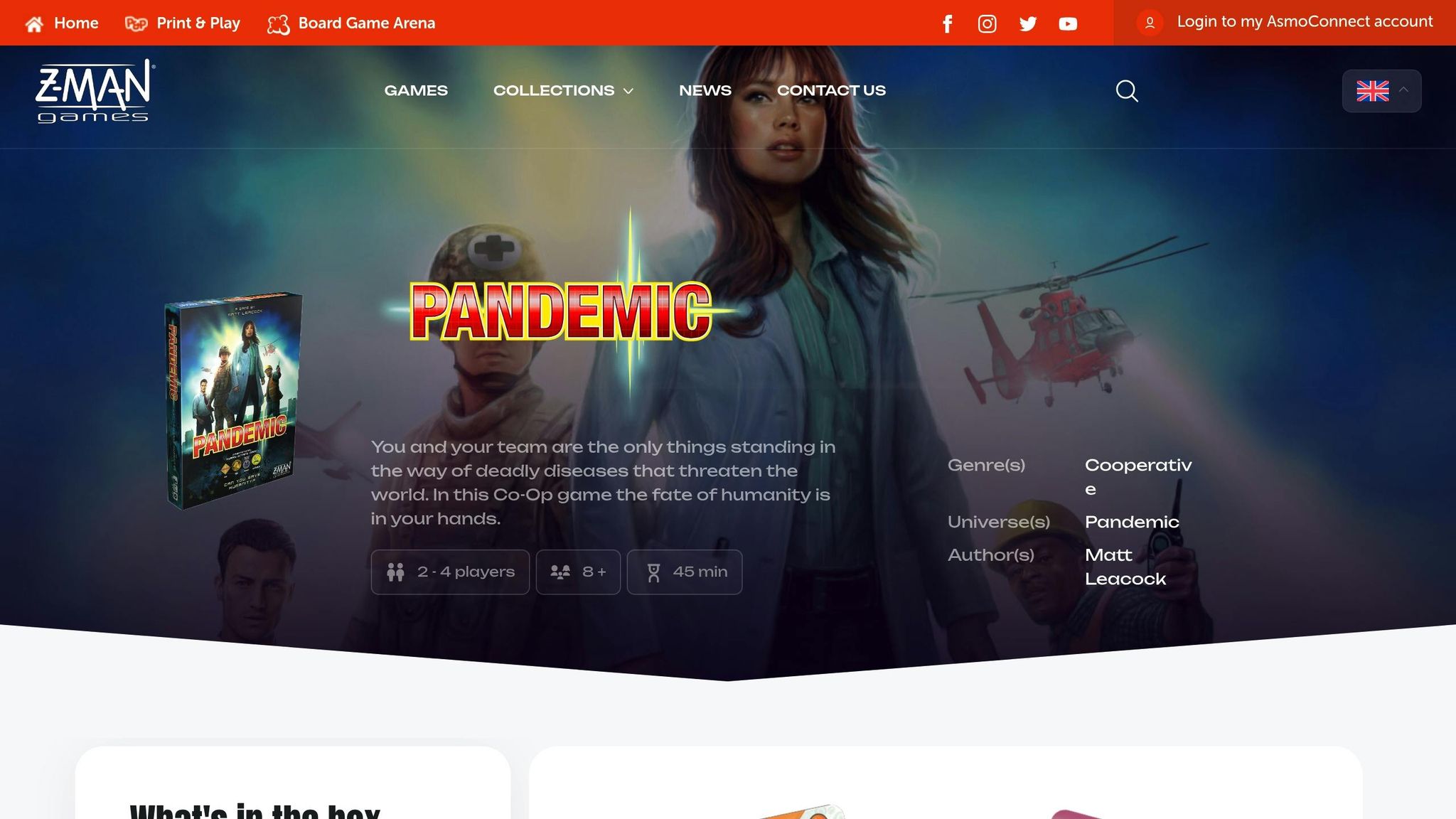
Unlike Catan's competitive gameplay, Pandemic emphasizes teamwork and collective problem-solving. This cooperative board game challenges 2-4 players to step into the shoes of disease-fighting specialists, working together to stop four deadly diseases from spreading across the globe.
Each player takes on a specific role - like Medic, Scientist, or Dispatcher - each with its own strengths. Success depends on using these abilities wisely. For example, the Medic is great at controlling outbreaks, while the Scientist focuses on finding cures faster.
Role-Based Problem Solving
Players must coordinate their actions across a global map, responding to crises as they arise. Each role brings a different perspective, encouraging strategic teamwork and creative solutions.
Strategic Resource Management
With limited actions per turn, players face constant trade-offs. Should you focus on containing outbreaks, researching cures, or sharing cards? Every decision matters, and balancing these priorities is key.
Scaling Difficulty System
The Epidemic card adds an extra layer of tension by increasing infection rates and introducing new hotspots. This forces the team to rethink their strategy on the fly, keeping the gameplay dynamic and challenging.
Pandemic's 45-minute sessions are highly rated, earning a 7.6/10 on BoardGameGeek from over 110,000 users. The fast-paced gameplay tests your ability to think clearly under pressure.
Communication and Collaboration
Success in Pandemic hinges on constant discussion. Teams need to align on:
- How to allocate resources
- Evaluating risks and setting priorities
- Planning for worst-case scenarios
The game's complexity ensures no single player can dominate, as solving its challenges requires input from everyone. Over time, players improve their ability to recognize patterns and understand how interconnected systems work.
Much like Chess builds pattern recognition and Catan hones planning, Pandemic sharpens system-level thinking - an essential skill for tackling modern problems. Its theme has become especially relevant, highlighting the importance of proactive, coordinated efforts.
sbb-itb-1ed942f
4. Ticket to Ride
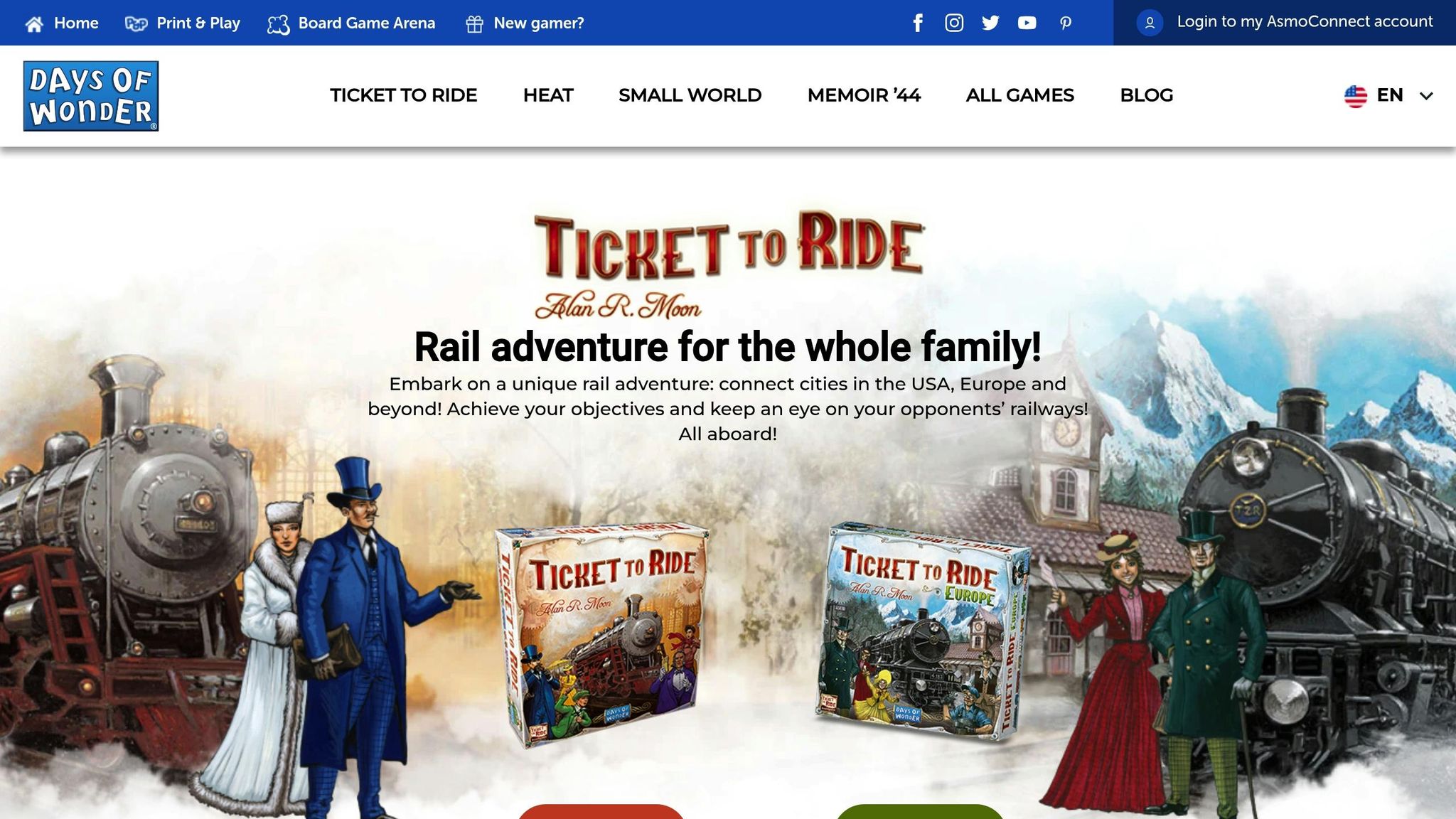
Ticket to Ride, designed by Alan R. Moon, is a route-building game that challenges players to connect North American cities through strategic railway networks. Unlike Pandemic's focus on teamwork, this game emphasizes spatial problem-solving and logistical planning.
Strategic Planning and Spatial Reasoning
At its core, Ticket to Ride revolves around collecting colored train cards to claim railway routes. Players must carefully plan their moves, anticipate opponents' strategies, and adjust to blocked paths. Key gameplay elements include:
- Mapping out the best routes across the board
- Predicting how opponents might interfere
- Balancing multiple destination goals
- Adjusting strategies as the game evolves
Strategic Decisions
The game constantly pushes players to make tough choices, such as:
- Building up a strong hand versus risking losing key routes
- Prioritizing short-term points or focusing on longer connections
- Choosing safer, shorter routes or aiming for high-reward, riskier tickets
Real-World Problem-Solving Applications
The challenges in Ticket to Ride mimic logistics and urban planning principles. Dr. Shannon Whitten, a psychology professor, highlights how the game strengthens executive function skills like planning and cognitive flexibility. These decision-making processes mirror those used in fields like supply chain management and city planning.
With a 4.8/5 rating from over 100,000 BoardGameGeek users, Ticket to Ride's blend of accessibility and depth makes it an excellent tool for honing spatial reasoning and adaptive planning skills. Its focus on geographic strategy complements the analytical depth of Chess and the adaptive thinking required in Catan, creating a well-rounded cognitive skill set for players.
5. Risk
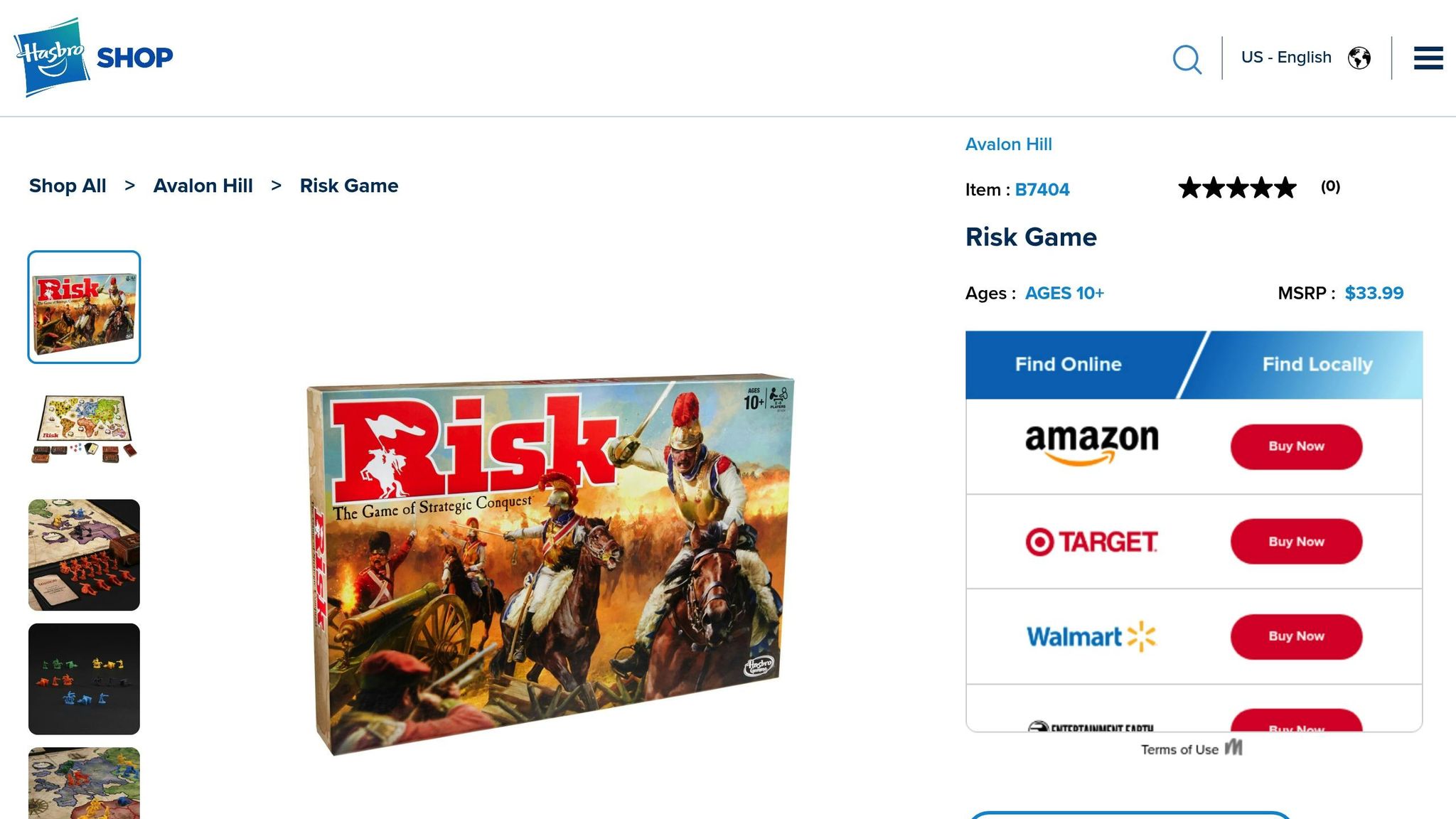
Risk takes players beyond spatial logistics into the realm of global strategy and diplomacy. First released in 1957, this classic game revolves around territory control, where players vie to dominate 42 territories through army deployment and dice-based combat. It’s a game of balancing calculated aggression with well-timed defense.
Strategic Depth Through Territory Control
At its core, Risk challenges players with three interconnected mechanics that sharpen problem-solving skills:
- Resource Allocation: Controlling entire continents grants extra reinforcements, giving players a tactical edge.
- Probability Analysis: The dice-driven combat system pushes players to weigh the odds of success in every attack or defense.
- Diplomatic Negotiations: Forming alliances can be the difference between survival and defeat.
Cognitive Skills and Practical Applications
Risk blends Chess-like strategic foresight with negotiation dynamics similar to Catan, offering a well-rounded mental workout.
| Skill | Practical Use |
|---|---|
| Diplomatic Negotiation | Resolving conflicts |
| Probability Analysis | Making data-based choices |
| Long-Term Planning | Leading organizations |
Modern Editions for Deeper Strategy
Variants like Risk: Legacy and Risk: 2210 A.D. add layers of complexity, including permanent board changes and resource management, making the game even more dynamic and thought-provoking.
How It Develops Problem-Solving Skills
Risk’s ever-changing board state and lengthy gameplay sessions require players to continuously adapt their strategies. Shifting territorial control and unpredictable moves from opponents force players to think critically and plan across multiple layers. By combining probability management, strategic planning, and social negotiation, Risk offers a well-rounded approach to building decision-making skills for players of all ages.
Game Features at a Glance
Here's a quick look at some popular games and the skills they help develop:
| Game | Players | Time | Difficulty | Focus Areas |
|---|---|---|---|---|
| Chess | 2 | ⏱30-60min | ★★★ | Strategic planning, Pattern recognition |
| Catan | 3-4 | ⏱60-120min | ★★☆ | Resource management, Trading |
| Pandemic | 2-4 | ⏱45-60min | ★★☆ | Cooperation, Crisis management |
| Ticket to Ride | 2-5 | ⏱30-60min | ★☆☆ | Route planning, Set collection |
| Risk | 2-6 | ⏱120+min | ★★★ | Area control, Risk evaluation |
Why These Games Work
These games are not just fun - they're designed to sharpen your mind. Their mechanics are built around real-world problem-solving skills, offering players a chance to practice thinking critically and making decisions under pressure.
Each game brings something different to the table. For instance, Chess hones strategic thinking, while Catan encourages resource management and negotiation. Whether you're looking for a quick mental workout or a longer, more immersive challenge, there's something here for everyone. Plus, the variety ensures you can pick a game that fits your schedule and learning preferences.
Final Thoughts
From the strategic depth of Chess to the teamwork required in Pandemic, these games offer a well-rounded mental workout. Research published in Frontiers in Psychology in 2016 found that strategy-based games can improve decision-making skills and boost memory in children.
Their physical elements and social interaction provide benefits that even today's video games can't entirely match. As highlighted in our comparison table, each game hones specific skills while sharing the common benefit of making complex decision-making both fun and engaging.
"The study demonstrated how games that involve planning and adapting to changing scenarios stimulate the brain's prefrontal cortex, which governs executive functions such as problem-solving and focus".
Whether for classrooms or family game nights, choose games based on the skills you'd like to develop. For example, Ticket to Ride is perfect for teaching spatial reasoning in geography lessons, while Risk introduces concepts of negotiation and conflict resolution. Start with beginner-friendly options like Ticket to Ride, then move on to more complex games like Chess or Risk, allowing players to build their skills gradually.
What sets these games apart is their ability to combine straightforward rules with strategic depth. They're more than just entertainment - they're tools for lifelong mental growth, helping to sharpen problem-solving abilities while fostering meaningful social connections through shared experiences.






